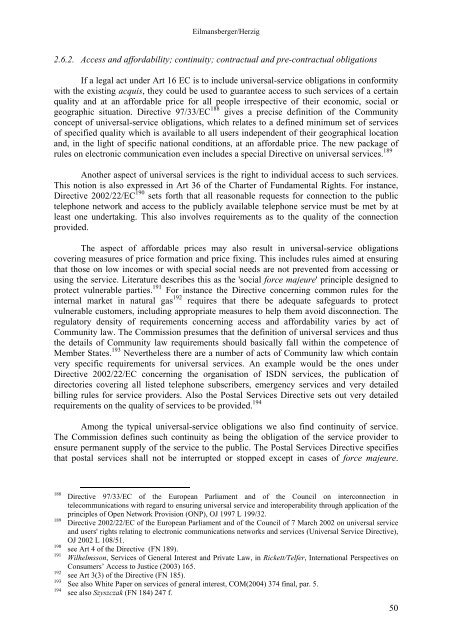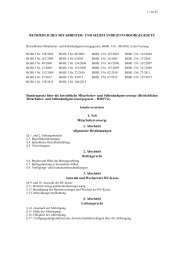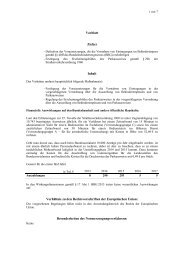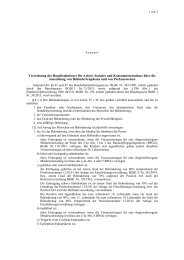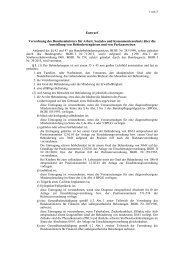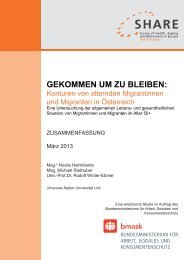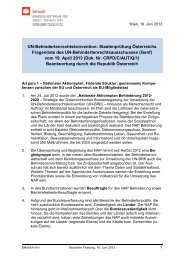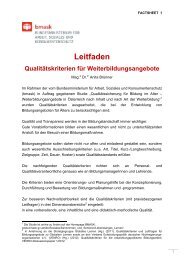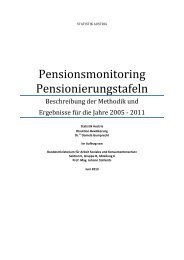Social Services of General Interest (SSGI)
Social Services of General Interest (SSGI)
Social Services of General Interest (SSGI)
Create successful ePaper yourself
Turn your PDF publications into a flip-book with our unique Google optimized e-Paper software.
Eilmansberger/Herzig<br />
2.6.2. Access and affordability; continuity; contractual and pre-contractual obligations<br />
If a legal act under Art 16 EC is to include universal-service obligations in conformity<br />
with the existing acquis, they could be used to guarantee access to such services <strong>of</strong> a certain<br />
quality and at an affordable price for all people irrespective <strong>of</strong> their economic, social or<br />
geographic situation. Directive 97/33/EC 188 gives a precise definition <strong>of</strong> the Community<br />
concept <strong>of</strong> universal-service obligations, which relates to a defined minimum set <strong>of</strong> services<br />
<strong>of</strong> specified quality which is available to all users independent <strong>of</strong> their geographical location<br />
and, in the light <strong>of</strong> specific national conditions, at an affordable price. The new package <strong>of</strong><br />
rules on electronic communication even includes a special Directive on universal services. 189<br />
Another aspect <strong>of</strong> universal services is the right to individual access to such services.<br />
This notion is also expressed in Art 36 <strong>of</strong> the Charter <strong>of</strong> Fundamental Rights. For instance,<br />
Directive 2002/22/EC 190 sets forth that all reasonable requests for connection to the public<br />
telephone network and access to the publicly available telephone service must be met by at<br />
least one undertaking. This also involves requirements as to the quality <strong>of</strong> the connection<br />
provided.<br />
The aspect <strong>of</strong> affordable prices may also result in universal-service obligations<br />
covering measures <strong>of</strong> price formation and price fixing. This includes rules aimed at ensuring<br />
that those on low incomes or with special social needs are not prevented from accessing or<br />
using the service. Literature describes this as the 'social force majeure' principle designed to<br />
protect vulnerable parties. 191 For instance the Directive concerning common rules for the<br />
internal market in natural gas 192 requires that there be adequate safeguards to protect<br />
vulnerable customers, including appropriate measures to help them avoid disconnection. The<br />
regulatory density <strong>of</strong> requirements concerning access and affordability varies by act <strong>of</strong><br />
Community law. The Commission presumes that the definition <strong>of</strong> universal services and thus<br />
the details <strong>of</strong> Community law requirements should basically fall within the competence <strong>of</strong><br />
Member States. 193 Nevertheless there are a number <strong>of</strong> acts <strong>of</strong> Community law which contain<br />
very specific requirements for universal services. An example would be the ones under<br />
Directive 2002/22/EC concerning the organisation <strong>of</strong> ISDN services, the publication <strong>of</strong><br />
directories covering all listed telephone subscribers, emergency services and very detailed<br />
billing rules for service providers. Also the Postal <strong>Services</strong> Directive sets out very detailed<br />
requirements on the quality <strong>of</strong> services to be provided. 194<br />
Among the typical universal-service obligations we also find continuity <strong>of</strong> service.<br />
The Commission defines such continuity as being the obligation <strong>of</strong> the service provider to<br />
ensure permanent supply <strong>of</strong> the service to the public. The Postal <strong>Services</strong> Directive specifies<br />
that postal services shall not be interrupted or stopped except in cases <strong>of</strong> force majeure.<br />
188<br />
Directive 97/33/EC <strong>of</strong> the European Parliament and <strong>of</strong> the Council on interconnection in<br />
telecommunications with regard to ensuring universal service and interoperability through application <strong>of</strong> the<br />
principles <strong>of</strong> Open Network Provision (ONP), OJ 1997 L 199/32.<br />
189<br />
Directive 2002/22/EC <strong>of</strong> the European Parliament and <strong>of</strong> the Council <strong>of</strong> 7 March 2002 on universal service<br />
and users' rights relating to electronic communications networks and services (Universal Service Directive),<br />
OJ 2002 L 108/51.<br />
190<br />
see Art 4 <strong>of</strong> the Directive (FN 189).<br />
191<br />
Wilhelmsson, <strong>Services</strong> <strong>of</strong> <strong>General</strong> <strong>Interest</strong> and Private Law, in Rickett/Telfer, International Perspectives on<br />
Consumers’ Access to Justice (2003) 165.<br />
192<br />
see Art 3(3) <strong>of</strong> the Directive (FN 185).<br />
193<br />
See also White Paper on services <strong>of</strong> general interest, COM(2004) 374 final, par. 5.<br />
194<br />
see also Szyszczak (FN 184) 247 f.<br />
50


